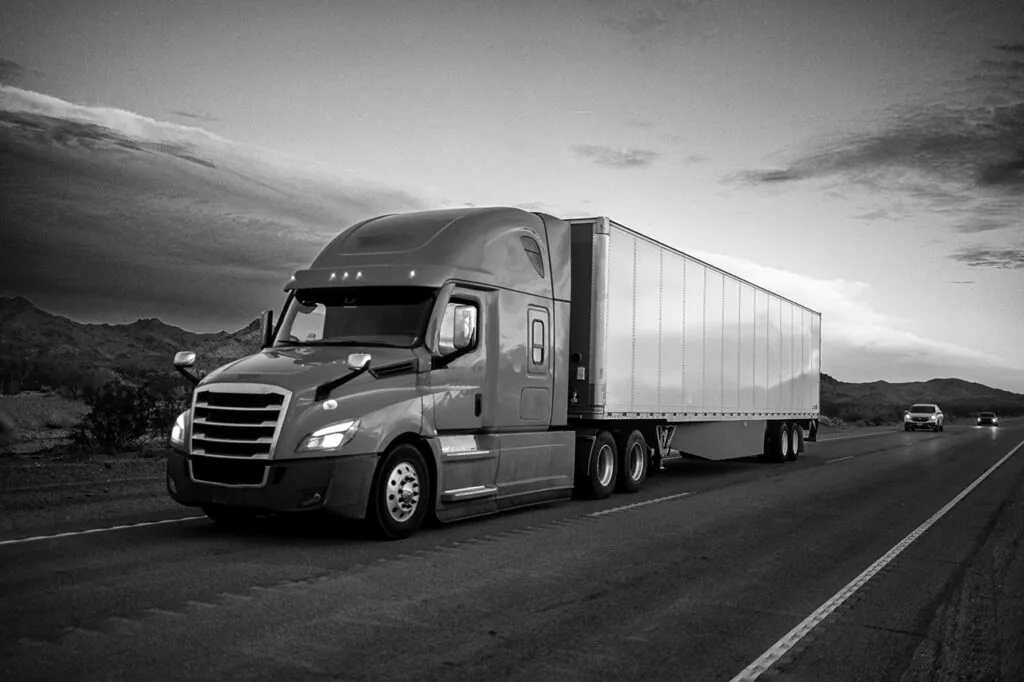Raleigh, NC: (919) 277-9299

When a trucking company fails its safety obligations and continues non-compliant and negligent operations, it puts other drivers on the roadways at risk. A freight carrier must have checks and balances to evaluate its drivers, equipment, and protocols. Trucking companies that hire drivers with an accident history or who showcase ongoing negligence jeopardize everyone’s safety.
Investigating a company’s non-compliance is a good first step after a semi-truck crash to determine the cause and liability. While most individuals don’t have an in-depth knowledge of commercial vehicle safety regulations, trucking accident attorneys do. Bell Legal Group understands how to identify safety management failures that lead to dangerous collisions.
Mismanaged Fleet Safety Controls
Freight companies are expected to develop safety management controls to establish and maintain compliance with industry regulations, minimizing roadway risks. These policies and procedures should create safeguards, protecting the public from negligence that leads to accidents. Unfortunately, when semi drivers cause crashes, investigations often reveal failures in the trucking companies’ safety obligations.
Lack of Employee Oversight and Accountability
A safety manager in a trucking company’s operations is often responsible for developing an accident prevention program to implement training, risk assessments, and driver supervision. Employee accountability suffers when businesses don’t prioritize safety oversight roles. Trucking companies that hire drivers with a history of accidents, or incur frequent safety violations and fail to implement programs to correct the risky behavior, jeopardize highway safety.
Non-Compliant Fleets
One essential task of a trucking company safety manager is to maintain compliance with Hours of Service (HOS) guidelines. The Department of Transportation (DOT) established HOS regulations to limit the duration a trucker may be on the road. Freight companies and their employees must track driver data to limit HOS violations. Non-compliance can lead to drowsy driving or fatigue, two common causes of trucking accidents.
Commercial trucks are required to follow trailer weight limits and cargo security. Overweight trucks may be susceptible to tire blowouts or brake failures that lead to collisions. Improperly secured cargo can shift during transportation, causing rollovers and other accidents. The company must enforce weight limits and proper loading techniques or face liability in a trucking accident lawsuit attributed to non-compliance.
Unsafe Semi-Truck Drivers
It is a trucking company’s responsibility to employ trained, qualified drivers. Trucking companies that hire drivers with accidents on their records, and fail to retrain them or enforce safety measures, put others on the roadways at risk. Semi truck operators with a history of substance abuse may not be tested until they cause an accident—when it is too late to protect motorists from driver negligence. A safety manager in a trucking company’s prevention program should take a preemptive stance on drug or alcohol testing to avoid deploying unfit drivers.
A driver trying to meet unrealistic delivery expectations can also violate trucking laws and cause an accident. When commercial vehicle operators face pressure to deliver on tight deadlines, they may overlook HOS regulations, speed limits, and other safety measures, resulting in serious crashes.
Poor Vehicle Maintenance
Maintenance keeps a truck’s vital systems working properly. When a freight company fails this obligation and a semi’s suspension, brakes, or steering fails, the truck driver can lose control of the vehicle and collide with others on the road. Whether it was the driver, maintenance technician, or safety manager in a trucking company who failed to uphold safety protocols, the carrier may be held accountable for any employee’s actions in a trucking accident lawsuit.
Identifying Unsafe Fleets
A swift and thorough investigation is key to gathering and preserving evidence after you’re injured in a crash with a box truck, 18-wheeler, or oversized vehicle. Law firms understand how to inspect trucks for safety flaws and violations, and establish a history of negligence. The trucking company’s safety score and its fleet logbooks are two sources that can demonstrate unsafe operations.
Trucking Company Safety Scores
The Federal Motor Carrier Safety Administration’s (FMCSA) Safety and Fitness Electronic Records (SAFER) system maintains trucking company safety scores. These scores are based on data from roadside inspections, traffic enforcement, and crash reports. A freight carrier should prioritize pre-employment screening to avoid hiring drivers whose past behavior is likely to negatively impact the safety rating. Scores for trucking companies that hire drivers with an accident record may reflect their operators’ lack of training or disregard for protocols. While trucking company safety scores rarely help to prevent accidents, they can help substantiate your claim about a fleet’s negligent operations.
Inaccurate Record-Keeping
One requirement of the FMCSA is keeping records for pre- and post-trip inspections, driving hours, vehicle repair, and other operational aspects. While the safety manager in a trucking company is often tasked with enforcing record-keeping, a lapse can be attributed up the chain to the company supervisors and owners, who may be held liable if a violation causes a trucking accident. The FMCSA may choose to audit a company’s files at any time, and these records can be essential evidence for a trucking accident case.
When a trucking company ignores safety regulations and you or a loved one is injured in a crash, let the team at Bell Legal Group help. Our attorneys understand freight carriers’ roles, safety obligations, and failures, and the evidence needed to support your claim. Contact us to tell us your story and discuss your next steps.
